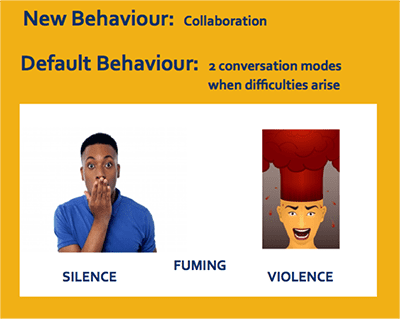It has been a long journey from World War I and II where competition and compliance were the reigning values and skills of the day. As I wrote last week, community living and collaboration (living and working alongside each other amidst diverse circumstances) is growing to be the way of the world.
Given this is the case, get prepared for some challenging work ahead. From someone who collaborated with her sibling to eliminate negative family-of-origin patterns of conflict, I can vouch for the considerable effort it took. Old habits die hard even when you love your collaborator.
For a very public example of the challenge awaiting us, consider the U.S. Presidential campaign and Donald Trump’s ability to arouse anger and violence in the American people. Arguably, anger also arouses international terrorist acts of public violence and mass killings by the mentally ill. Of course, road rage is a daily illustration of anger-induced verbal and physical violence. Who hasn’t yelled or sworn at a driver that just cut them off? Evidently, our lack of skill, and thus success, in managing anger is everywhere. Furthermore, few of us are exempt from anger’s polarized reactions of fuming silence or fuming violence, both of which are harmful to our health.
Fortunately, awareness is the key to unlock negative behaviour patterns and to bring about healthy change. If you are interested in your current capacity to collaborate, take the self-assessment below.
SELF-AWARENESS ASSESSMENT
Circle “T” for TRUE if you agree with the statement or “F” for FALSE if you disagree with the statement.
T F 1. I use abusive language toward others such as name-calling, insults, sarcasm or swearing.
T F 2. People tell me I become too angry, too quickly.
T F 3. I am easily annoyed and irritated and then it takes a long time to calm down.
T F 4. When I think about the bad things people did to me or the unfair deals I have gotten in life, I still get angry.
T F 5. I make critical, judgmental comments to others, even if they do not ask for my advice or help.
T F 6. I use passive-aggressive behaviours, such as ignoring the other person or promising to do something and then “forgetting” about it to get the other person to leave me alone.
T F 7. At times, I use aggressive body language and facial expressions, like clenching my fists, staring at someone or deliberately looking intimidating.
T F 8. When someone does or says something that angers me, I spend a lot of time thinking about what cutting replies I could have used at the time or how I can get revenge.
T F 9. I use self-destructive behaviors to calm down after an angry outburst such as drinking alcohol or using drugs, gambling, eating too much and vomiting, or cutting myself.
T F 10. When I get really angry about something, I sometimes feel physically sick (headaches, nausea, vomiting, diarrhea, etc.) after the incident.
T F 11. It is very hard to forgive someone who has hurt me even when they have apologized and seem very sorry for having hurt me.
T F 12. I like to win an argument and prove I am “right.”
T F 13. I make excuses for my behavior and blame other people or circumstances for my anger (like their behaviour, job stress, financial problems, physical illness, etc.)
T F 14. I react to frustration such that I cannot stop thinking about it or I can’t sleep at night because I think about things that have made me angry.
T F 15. After arguing with someone, I often hate myself for losing my temper.
T F 16. I get so angry sometimes I forget what I said or did.
T F 17. I know some people are afraid of me when I get angry, or they will “walk on eggshells” to avoid getting me upset.
T F 18. At times I got so angry I slammed doors, threw things, broke items, or punched walls.
T F 19. I have used threats to get my way or win an argument.
T F 20. I feel people have betrayed me a lot in the past, and now I have a hard time trusting anyone.
T F 21. Sometimes I feel so angry that I’ve thought about killing another person or killing myself.
SCORING this adaptation of the Miller-Patton Anger Self-assessment Test:
Note: This test is an informal screening test to help you find out more information about your own feelings and expressions of anger. It is not intended to be a clinical assessment.
If you answered “true” to 10 or more of these questions, you most likely have moderate-to-severe anger problems. If you answered “true” to 5 questions, you are most likely at risk for having a problem with your anger. Even if you answered “true” to just 1 of the questions, it may be helpful to learn some anger management techniques to improve your coping skills and ability to collaborate with others.
If you answered “true” to #21 and feel as if you cannot stop from hurting yourself or someone else, please call 911 for immediate help.
Now that you have completed the self-assessment, are you struggling to accept your score? Do you find yourself questioning the assessment’s authenticity in an attempt to invalidate your score and ease any discomfort you might be feeling? Such resistance and defensiveness are our default coping mechanisms that keep us from facing our anger. Take a deep breath and allow yourself to objectively consider the score you received. Everyone would do the world a great service by not assuming that out-of-control anger is not their problem.
Your assumptions drive your thoughts and actions at the deepest level, without
you even realizing. So step back, take an objective look, change the assumptions
that are limiting you, and you can literally change your life.? Ralph Marston
By the way, anger is OK. It is important to feel and express anger. What is not OK is to express it in ways that hurt, control and invalidate others and ourselves. Uncontrollable anger is everyone’s problem. Getting control over one’s anger is not easy work, but it is necessary.
Do not think of today’s failures, but of the success that may come tomorrow.
You have set yourselves a difficult task, but you will succeed if you persevere;
and you will find a joy in overcoming obstacles. Remember, no effort that we
make to attain something beautiful is ever lost.” Helen Keller
I am committing myself to not invalidate anyone when I get angry. What one step can you take to reward yourself with positive anger responses?
For more on collaboration and expressing anger positively, click here.





